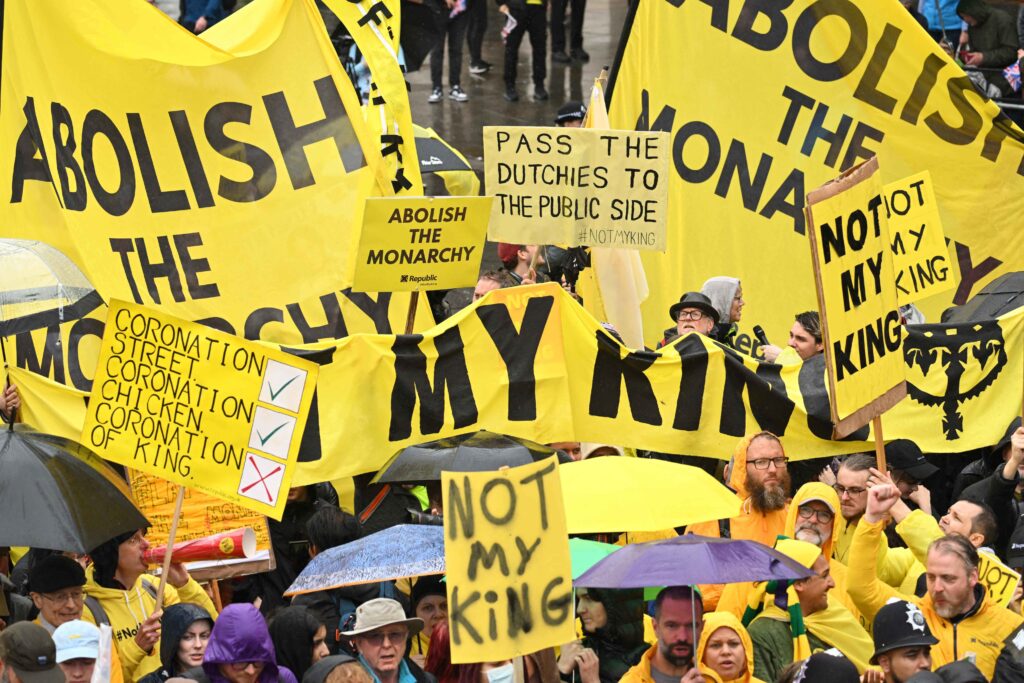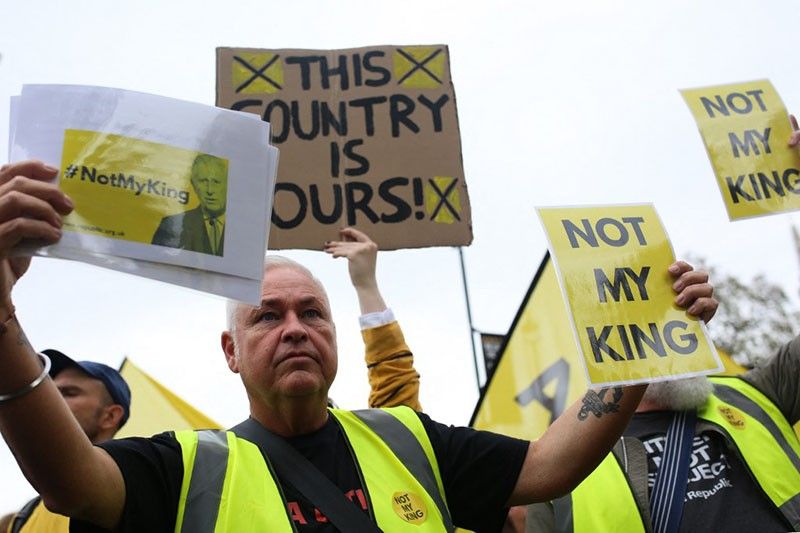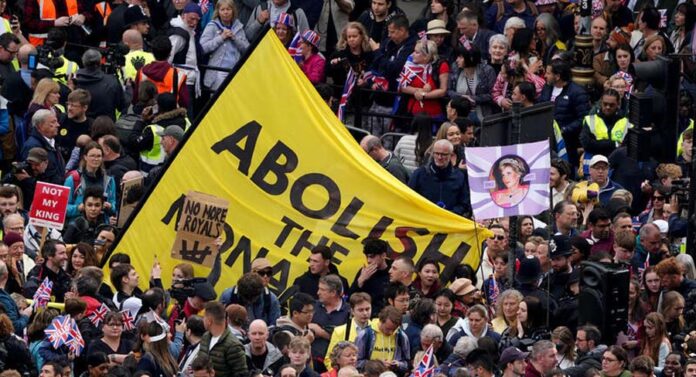Nigel Smith
The sickening eventuality of the coronation of Charles the Third is now a reality. The link to the feudal past has once more been affirmed by the state. The archaic and absurd spectacle of people in large bejewelled hats parading alongside thousands of troops, in fancy dress, all paid for by the British people shows a crass and sordid indifference for the needs of a people suffering systemic poverty and attacks on their human rights and working conditions. Pomp and ceremony replaces humanity, power is displayed and the authority of a class, who should be made obsolete in a modern world, is there for all to see.
Suppression of demonstrators
The dystopian spectacle of peaceful protesters being hauled away from the streets of London for simply expressing a contrary view and the deployment of new public order laws being used to suppress their peaceful protest is disturbing. The UK promotes a global image of being an open and tolerant society. Most of the British people are open and tolerant and views on race, religion, LGBTQ etc have moved in a progressive direction over recent decades. The British state however, has moved in the opposite direction, with more and more laws limiting the rights of workers and the right to protest being enacted. The UK criticises other countries, especially China, for its propagandistic and totalitarian approaches. There was a tremendous fuss made about the Chinese envoy being sent to the ceremony, because of their role in the suppression of the umbrella Movement in Hong Kong. How ironic therefore that demonstrators were being carted away in London for simply holding placards aloft or being suspected of wanting to tie themselves to railing.
Screen for the state
The UK has for a very long time used its own forms of propaganda. The monarchy itself is used as a screen for the state, with the pretence that its aims and those of the capitalist class are somehow different. The monarchy looks after us, is the mantra and the monarch can act as a form of restraint on the state – preventing it from carrying out excesses. Nothing could be further from the truth. In Australia in 1975, the Labor Prime Minister, Gough Whitlam, was pushed by the working class to carry out economic reforms. He was removed from office by the then Queens representative, the governor general, for daring to challenge capitalist orthodoxy.
The monarch is also commander of chief of the armed forces. Royals frequently join the armed forces and it is commonplace for them to strut around in full military regalia. The military of the UK swears an oath of allegiance to the monarch and in general the average soldier, sailor or airman will, because of the indoctrination they suffer when in military service, owe a greater sense of loyalty to the monarch than to the government of the day. They are indoctrinated with the concept that monarchy is permanent, government is temporary. The monarchy also holds reserve powers which include the power to call elections, dissolve governments and even declare martial law.
The national anthem, which is in-itself an oath of allegiance to the monarch, is an example of soft propaganda, as is the virtual compulsory wearing of the poppy on the BBC in the weeks leading up to armistice day – a day when royalty once more is given the opportunity to parade its links to the military and its power.

Scandals and obscene wealth
The scandals around the actions of various royals illustrate corrupt and even illegal behaviour – the sycophancy of the British media a sickening background to the disturbing truths.
While the British people and British workers heroically struggle to earn a living, raise their children and help and care for their friends and families, the British ruling class demonstrates just how far above the ordinary people they actually are. Tens of thousands of police and military on the streets, a media frenzy and an ostentatious display of wealth and power illustrates this. The recent idea of the British people themselves being asked to swear allegiance to the monarch, as the aristocracy does is almost comic in its boorishness.
Moreover, the Royal family is one of the richest clans in England according to Forbes, as their wealth exceeds $28 billion. The monarchy cost the taxpayer in the UK £102 million a year, while they are exempt from most taxes.
Starmer and the TUC
At the same time the Labour leader Sir Keir Starmer sits at the centre of the establishment and acts as a cheer-leader for this exploitative and repressive reality. He flag-waves alongside the rest of the bellicose bastions of the old orthodoxy and calls for patriotism rather than working class solidarity.
Even the Trades Union Congress (TUC) sent out a sickening pro-monarchist message to its members. “We send our congratulations to King Charles III on the day of his coronation and thank everyone working to make today a safe and enjoyable event.” This illustrates the obsequious attitude of an institution that should know better.

About time they go
The popularity of the royal family is declining, but it is still true that a small majority of British people favour the retention of the monarchy. In a recent poll 52% said they supported the monarchy with 23% opposed to it. 20% were indifferent. Support for the monarchy however is much higher amongst older people, with people between the ages of 18 and 25 being evenly split on the issue.
When one considers the level of propaganda in favour of the monarchy and all the institutional support for it, it is surprising that support for the monarchy isn’t stronger. To live in the UK and be educated here, is to be subject to a continuous stream of pro-monarchist disinformation: in school, at public and sporting events, and via the drip drip drip of news stories and gossip about the interminable machinations surrounding this bunch of parasites.
The concept of hierarchy, which is so much part of the structure of British society is reinforced massively by the concept of royalty. It’s time they went. As representatives of a capitalism that uses every trick in the book both from present circumstance and historical example to remain in power, that time could not come soon enough.













